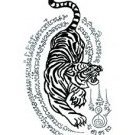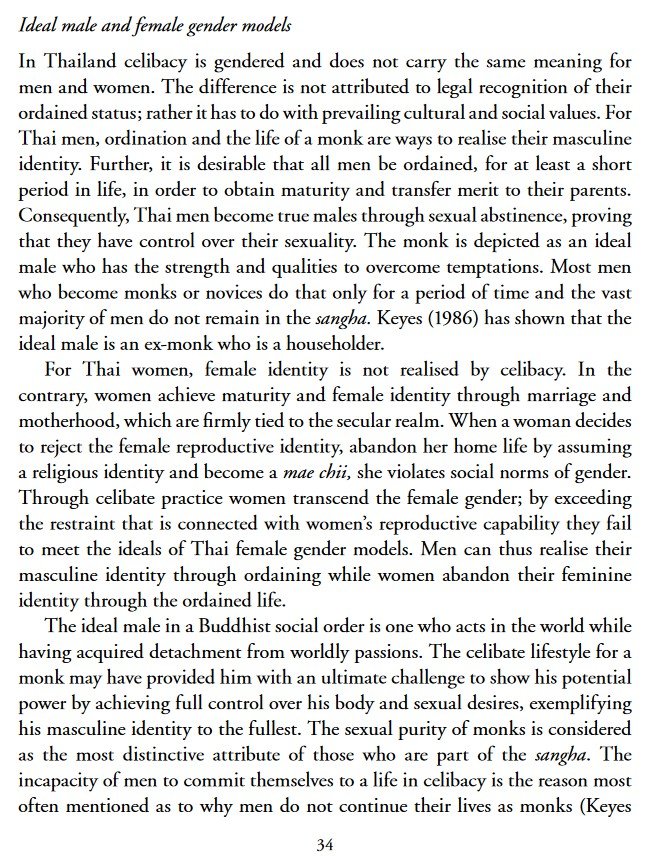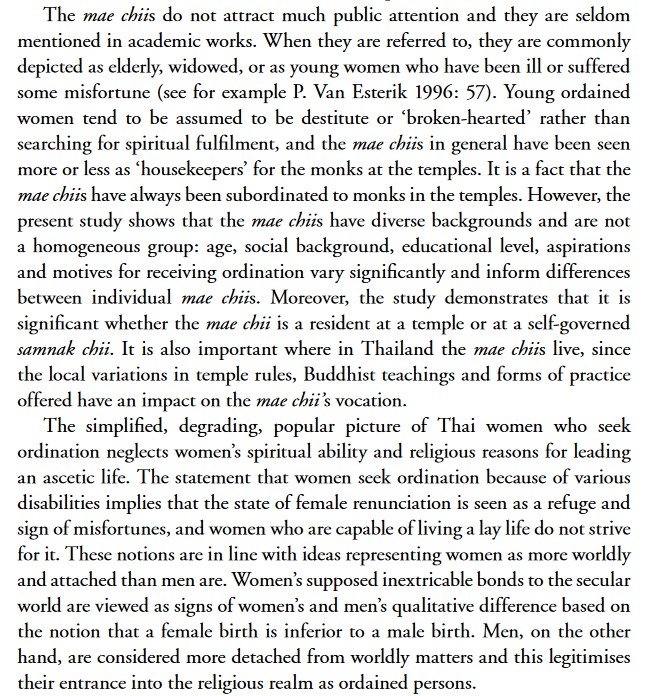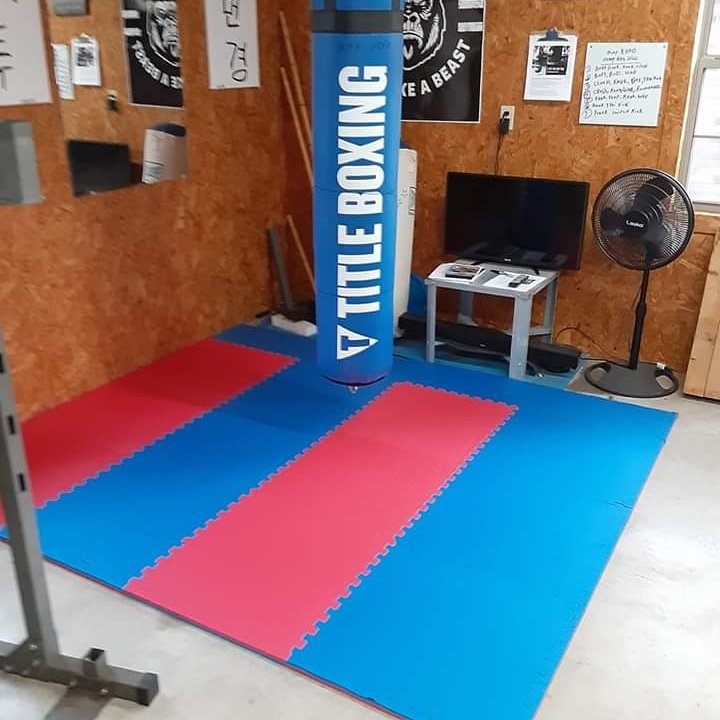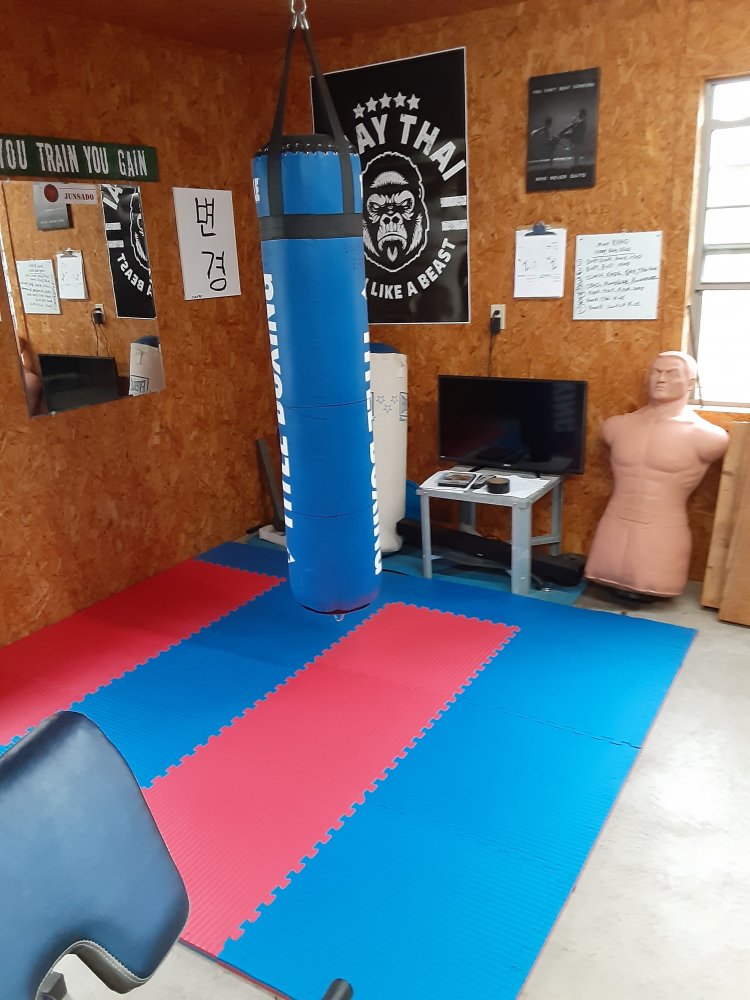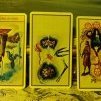Leaderboard
Popular Content
Showing content with the highest reputation on 04/14/2020 in all areas
-
Thanks everyone Am at the doc now in waiting room. A jiujitsu friend told me I could die or lose a limb, so shit my pants and ran to the hospital. His best bit was, "Look...I'm not trying scare you, but......"3 points
-
I'm reading a really informative and well-written study of the Maechi (or Mae Chii) of Thailand, MAKING FIELDS OF MERIT Buddhist Female Ascetics and Gendered Orders in Thailand, you can download it here (300+ pages): MAKING_FIELDS_OF_MERIT.pdf It details the field study of a class of women in Thailand who have devoted themselves to religious pursuits, vowing celibacy, taking on the ascetic life. They are often referred to as "nuns" in rough cultural approximation, and exist in a kind of no-mans-land of social status. Women cannot ordain as monks (Bhikkhunī) in Thailand, even though historically Bhikkhunī existed for centuries after Buddha established the order, largely due to a much argued over technicality in the laws of ordination. I'm not hear to discuss that dispute, but rather draw an compelling parallel between the struggles of religiously devoted women in Thailand, the female fighters as well. I am not making these equal ambitions, but suggesting that this study draws out facts about the Maechi struggle that shed light into the nature of Muay Thai and the deeper social significance it plays in Thailand's culture. In making the Maechai situation clear, some aspects of gendered Muay Thai also become clear. I'm going to try and cut to the chase a bit, and not build out too much context. Maybe more context can be added in responses, or in a coming Muay Thai Bones podcast where it might be great to discuss this with Sylvie. I'm going to focus my thoughts on just two short passages. The first describes the "Ideal Male" in Thai culture, in the context of expected short terms stays in monk hood by most males in the society. And the second speaks of the dismissive position Maechi find themselves in, having renounced worldly attachments and devoted themselves to religiosity. On the Ideal Male The key sentence for me is the last sentence of the first paragraph. The "ideal male is an ex-monk who is an householder". In the flow of society, the ideal male proves his ability to abstain, to have self-control --- for a short period of time --- than then assumes the householder position having proven, or graduated into adulthood. It is important that the author is making a kind of discrimination of what "ideal" means. In the stronger sense of ideality, monks in their life long self-control, form the ideal, but in a more connotative, practical sense, it is the process of touching upon that ideal, and then taking your place running a household, that is the ideal. On the Non-Ideal Female Here is where it gets really interesting, and indeed painful. While striving toward what one would assume is a genderless Buddhistic ideal, non-attachment and religious devotion, Maechi are actually downgraded and cast as social failures. They are, by a stereotype, heartbroken or destitute in some way, falling out of their gendered role, and simply taking the refuge of Buddhism (ironically enough, in the pledge you make to convert to Buddhism in Thailand you are asked to take the Sangha,the "Church" so to speak, as your refuge). While men are lauded for their self-control, even for a short period of time, Thai women can be doubted and even side-glanced. The Maechi and Nakmuay Ying This double standard as to devotion to self-control commitments, and assuming social roles plays out in very suggestive way when we shine the same light onto Muay Thai, not just as a sport, but as a social art of self-cultivation and individuation. To understand more on how the Nak Muay personifies some of the same values and experiences of monkhood for Thai boys and men, read: Thai Masculinity: Postioning Nak Muay Between Monkhood and Nak Leng – Peter Vail. It's enough to say that one of the main fabrics of Muay Thai, not only in it's aesthetic, but also in it's core coming of age experience, of boys becoming men, is the hypermasculine way it asks a fighter to embody self-control. This falls directly in line with the ideal of masculinity expressed in the passage into monkhood by Thai men. (And this is one reason why international kickboxing inspired "beast mode" fighting aesthetics being projected onto Muay Thai in Thailand are so painfully tearing at the very meaning of what Muay Thai is.) In any Muay Thai gym in Thailand that is raising young Thai fighters you are witnessing the same self-control project that is expressed through monk hood. In monk hood this self-control is perhaps quite widely stereotyped as sexual desire (though it is much more than this, of course), in the Nak Muay it is controlling the extremes of emotion (anger, tears at loss or physical pain, overt pride). These are both projects of control. Control yourself, then become a man. Young teen Thai fighters are also often denied girlfriends, and one of the reasons why females were kept out of traditional gyms is likely related to this same "self-control" project of personal transformation. The question I'm opening up is found in the rough parallel between the fact that the same self-control project when taken up by Maechi (Thai female religious devotees) is not taken up as admired, or in some important sense of even having a home in society. Often the Maechi are seen as a kind of celibate "wife" of monks, cooking and cleaning at the temple. Her devotion to one of the highest, and theoretically genderless aims of human existence (which at the face of it will be admired in the abstract), becomes in a sense, unreadable. Part of this is there is no place for it. Women cannot become Bhikkhunīs (monks). They cannot take the place of recognition and institutional support that would make their devotion readable to the people. And, I hope this does not appear as too much a stretch, but Thai Nakmuay ying cannot fight in (or even touch) the National Stadia of Thailand. Thai female fighters can devote themselves to not only acquiring the skills and experiences that make them the best fighters in the world, but also steeping themselves in the same social conditioning, submitting to the same "self-control" inculcation that turns Thai boys into men, as Nak Muay - but, their accomplishments ultimately become unreadable against the backdrop of gender role expectations, in the family. The values of self-control that make up a great Muay Thai fighter in Thailand indeed become esteemed and admired, whether they appear in a young male fighter or a young female fighter, just as a devoted female meditation-ist, or a male meditation-ist would be esteemed and admired, but for each vocation there is no readable place for the female devotee to graduate to. There is no Lumpinee, there is no monk hood. And the reason for this, ultimately, is found in the way that Thai women are asked to relate to their desire, and the role it plays in society at large.1 point
-
1 point
-
I agree with SP if the home remedies don't work you might have to get it checked out by a medical professional. I totally understand why you're on the forum asking for advice though, with the COVID19 situation it's a little worrisome going to the doctor right now. I wonder if there's any other online medical websites you can try to inquire about your situation. I wish you the best of luck and I hope your elbow starts healing soon.1 point
-
Something my gym was doing before the corona lockdown, was working with local doctors as something people with depression could be prescribed to see if we could help them by giving them free training/physical activity. I agree with LengLeng, it's a double edged sword. One of my students is a trans-man, who is going through the process of transitioning and all the mental health problems that can come with that very stressful life change. Muay Thai helps him - but it also creates challenges that can in of itself be stressful.1 point
-
To follow more some of the essential idea proposed here, the study trades on the dichotomy or contradiction in that the spiritual emptiness and non-attachment of Buddhistic practice necessarily goes beyond identity (which is attachment), and therefore gender. The aim itself is toward genderlessness, while the social conventions which structure that practice are quite gendered and hierarchical. I would suggest that the very same thing exists in Thailand in terms of fighting. Thailand has a Fight Culture which celebrates fighting, or "chon" (clashing) in a pure sense. For this reason men fighting, children fighting, women fighting, chicken fighting, and even beetle fighting all participate in the same essential thing, the chon of spirit. You can check out Sylvie's articles on Bettle Fighting in the North to see aspects of this: Muay Thai Clinch is Not Boring – Gwang Chon – Battle Beetles of Thailand - Part 1 Underground Gambling, Beetle Fights, Heart and the Clinch of Muay Thai - Part 2 These transcendent views are really part of the way in which Thailand can be very freeing for western female fighters. There is a real sense in which female fighters are just part of the chon of a universal spirit of battle, and that as long as the spirit is exhibited, it is celebrated. A nexus point in a possible comparison between Thai Maechi and Thai Nakmuay Ying is the way in which there is an operative transcendent, gender-less apex of celebration, something which unites all participants, but also, a hierarchy of laddered social striation which can lead both also unreadable, or at least very hard to read.1 point
-
This is such an engaging topic I've followed for a while but been reluctant to post because I find it so hard to discuss my mental health openly. Although I too feel muay thai can do so much to empower you, I feel it can easily break you down. If you're in a vulnerable mental state, training in a Thai muay thai gym can add tonnes of bricks to the mental stress. It's hard to deal with hard sparring when feeling like you're made of glass and you're stuck behind a wall and you can't really hear anybody else but the critical loudspeaker in your own mind. And also especially since relationships in Thailand are so important and maintaining relationships can be draining or impossible when you're in a state where you cannot even maintain the relationship to yourself. Add to this promoters with other interests than putting on a good fight card. Or trainers demanding respect. Further, as a woman, there are so many invisible barriers to climb. And sometimes it doesn't matter what you do, doors simply don't open. I think for me personally, I might have at one point taken on too much and probably should've stayed away from the gym and all the relationship maintenance for a while until I was stronger. Instead of trying and trying and getting disappointed. Even though I'd go back to my gym in a heartbeat if I could (my plan was to be in Bangkok right now to fight) my mental health benefitted tremendously from training at a gym with no active fighters and having the space just to push myself how I wanted and play around for a while. Anxiety is awful, it's like a dragon in your chest clawing. But at least there's some kind of moving energy. Depression is how I imagine dark matter. It just swallows you.1 point
-
This was my guys first competition. Sharing it here, because this is quite a nice, private forum rather than a place where you can get concrete feedback. Bit of background: My fella is ex-army, was discharged due to injuries that meant he was not allowed to go on tour in Afghanistan. He was training with me for 8 months prior to this, with no martial arts experience outside of what he had learned in the military. These months were consisting mostly of us drilling the basics and an ongoing struggle to get him to fully commit to his strikes in sparring. He is always the gentleman and doesn't want to hit anyone too hard, which I respect, but I also felt this made it difficult for me to judge his process. When we confirmed that he had a fight booked, I came to the conclusion that the easiest way to get him to really commit to power shots was to hone his leg kicking game in order to get him confident, without having to sacrifice too much balance from throwing those beginner body kicks. There was an issue however. I learned that I am not particularly good at TEACHING leg kicks, despite them making up such a big part of my game. I go back to the drawing board, we re-learn the leg kicks and we essentially drill them for 5 weeks. Specifically focusing on reacting with leg kicks and moving backwards while leg kicking along with L-steps and hand traps to keep him fighting, while moving back towards the ropes. This was the end result. I was worried initially, as I am still new as a coach and this is my first fighter rather than hobbyist who trains for fun and fitness. After the first round, I ask him how he's feeling, he says it's good. I warn him that we don't know how our opponent will be coming out in the second round. After more of the same in the second round I tell him to keep doing exactly what he's doing. I found that I didn't want to suggest anything or give him any advice that would necessarily make him over think and lose the work he was doing. There are a lot of things that I want to work on, getting the fundamentals more solid - but I'd love feedback from you guys, Sylvie, Kevin etc. as a fresh perspective can only help. My fighter is in the camo shorts. I had them made specially for him as a tribute to his days in the royal army, the linework in the colours of his team. All the best1 point
-
I've found the blending of the feminine and the masculine within Muay Thai (from my very fresh eyes mind you) to be one of the most fascinating things about it. As a person who's learned more and more about my own identity as time has gone on, finding a focus and a confidence through this art makes it a powerful space for me. Knowing that Saenchai exists right along side Buakaw, that -Grace Balance and Beauty- are just as important as -Power Speed Resilience-, that it's a dance as much as it is a martial art. I'm just in love! This community seems to capture all the complexity of that. Blessed I've landed here amongst you.1 point
-
Ah I’m hearing you! I’ve got Eastern European blood too and culturally I see differences too. My fathers side is italian which is completely opposite hahaha! it’s all very interesting.1 point
-
Oh of course, there are examples for sure at the super successful level, Mike Tyson like you say. And more recently Fury would be the obvious one. Am Eastern European myself, where culturally it's something that's just not spoken about. It's drilled into us early on that complaining must be avoided - it's even shameful. Don't mean complaining about money and bills etc - that's normal. But on personal issues.1 point
-
I think it depends what type of gym you are in, Or what culture you are living in. I’ve heard males discuss their mental health and addiction problems before and They are well respected in the MT community. I don’t think it’s uncommon for fighters to talk about their heart. for example MikeTyson admits he is an emotional guy. I Do agree though that this virus is getting more people to connect and open up.1 point
-
Wanna know something? You all have to just take my word for it, but a conversation like this has never - could never - come up in *any* guy's locker room in *any* gym, in *any* country so far, in my training memory of doing the sport. Never. Would be unthinkable. Even though half the locker room or more probably has dudes with stories just like you all describe. Maybe Corona's making people more open now. Like, so much more messaging between family and friends these days. Don't ya find?1 point
-
Muay Thai really is my anti depression. I was in a mentally abusive relationship a few years ago just as I lost my Dad to cancer and it left me a little bit fucked in the head. I’d find myself falling into depression for no real reason. It was like my brain was used to those emotions. Muay Thai pulls me out of those thoughts. I too have Had bad addiction problems, like most emotional artists we drink or do drugs and especially in the groups we keep. it’s acceptable to get completely smashed and talk junk. Or drink after gigs etc. Muay Thai has helped me to stop all those things. Sober 5 years, no drugs, no smokes, no alcohol. Spirituality it has helped me so much too, I have a few Sak yants and amulets etc. I try hard to follow this way of living bugger I should of totally submitted THIS response into the new competition!1 point
-
I've posted about my chronic and invisible illnesses in the women's section before. In short, I am a bipolar woman with autoimmune thyroid disease and fibromyalgia. So if anything goes one way or the other, I'm a hot mess. Finding muay thai was probably one of the best circumstances to fall upon me in the past few years, as it gave me something to focus all of my pent up rage and energy on. I used to be a very angry person, who didn't get along with anyone, not even my own husband and family. Now with muay thai I've become much more calm, much more patient. Learned to turn all the negative into positive, and to sometimes just let things be. Pick and choose my battles. If you all knew me personally, and seen me and the way I used to be, the difference is considerably significant. Muay thai therapy has done more for me in the last two years than sit down therapy has done for me in the past twelve.1 point
Footer title
This content can be configured within your theme settings in your ACP. You can add any HTML including images, paragraphs and lists.
Footer title
This content can be configured within your theme settings in your ACP. You can add any HTML including images, paragraphs and lists.
Footer title
This content can be configured within your theme settings in your ACP. You can add any HTML including images, paragraphs and lists.
